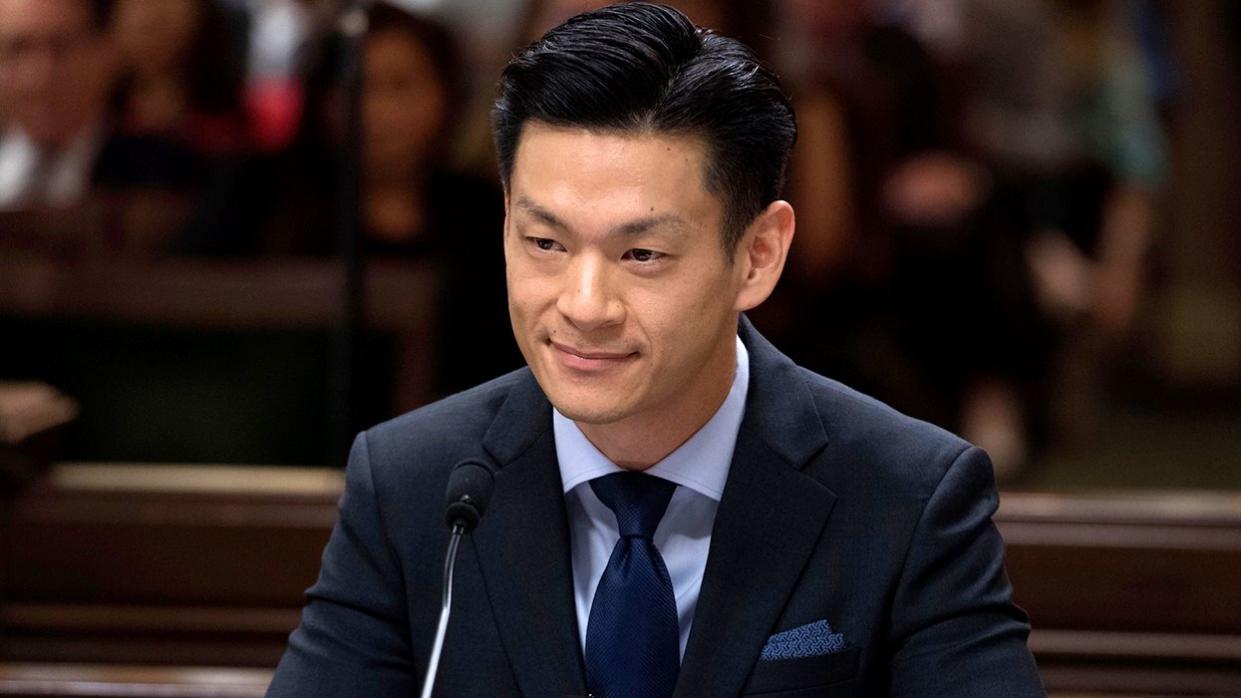Months after election, gay House candidate Evan Low will be on November ballot. Here's what happened

- Oops!Something went wrong.Please try again later.
- Oops!Something went wrong.Please try again later.
Evan Low, a gay man who’s currently in the California Assembly, is now one of two candidates who’ll be on the November ballot for a seat in the U.S. House from his state’s 16th Congressional District after a controversial recount booted a third candidate.
Why was there a recount, and why was it controversial?
The initial vote count in the March 5 primary found that former San Jose Mayor Sam Liccardo had finished first with 38,489 votes, while Low tied for second place with Santa Clara County Supervisor Joe Simitian, with 30,249 votes each. All are Democrats; in California, candidates from all parties run against each other in the primary, and the top two advance to the general election, regardless of party. The tie between Low and Simitian made the general election a top-three race, and neither objected or sought a recount, and the state has no provision for automatic recounts. The seat is being vacated by Democrat Anna Eshoo, who is retiring after representing the Silicon Valley-area district for 30 years.
However, any California voter can request a recount if they’re willing to cover the cost of the process. The 16th District recount was requested by Jonathan Padilla, a technology entrepreneur who’s worked in Liccardo’s mayoral campaign. This led to allegations from Low and others that Liccardo was working behind the scenes, as it would be better for him to face just one rival, not two, in the general election. Padilla requested the recount through a political action committee, Count the Vote; other Liccardo associates are involved with it as well, San Jose Spotlight reports. Max Zarzana, a local attorney, has filed a complaint against Liccardo with the Federal Election Commission, contending that the candidate and his campaign have created a “secret scheme to illegally coordinate with a newly-formed dark money Super PAC to do his CD-16 recount bidding.”
Liccardo has denied doing anything improper. “I did not request this recount,” he wrote in a commentary piece for San Jose Inside. “Neither I nor anyone in my campaign has communicated with Padilla or his donors about the recount. Candidates and their campaigns cannot lawfully communicate with independent expenditure groups. The fact that Padilla is a supporter of mine is not remarkable; every independent expenditure committee in history has been created by a candidate’s supporter.”
Meanwhile, Low came in for some criticism for his opposition to the recount, with Mercury News columnist Daniel Borenstein calling it “an amazing anti-democratic display that put his political objectives ahead of an accurate vote tally.” Low, as a young Asian American and the most progressive candidate in the race, would have benefited from two older white candidates splitting the more conservative vote, Borenstein wrote.
At any rate, the recount ended earlier this month with Low five votes ahead of Simitian. All candidates accepted the results.
What does Low say now, and what does he bring to the race?
Low has called the primary experience “character building” and is now understandably focusing on the general election. “My team and I knew that succeeding the esteemed Anna Eshoo would be challenging, so we see a race ending in a tie followed by a recount as character building for your next representative in Congress,” he wrote on X, formerly Twitter.
“We are very excited that my advancement into the general election was reaffirmed and I now look forward to the real work of tackling the big issues facing our country like reproductive freedom and affordability.”
His post didn’t mention Liccardo, but Low gave a shout-out “to the dedicated leader who took this wild recount ride with me, Joe Simitian, whose decades of public service remain an inspiration to me.”
— (@)
Low, who will turn 41 in June, has a long political résumé despite his age. He was first elected to the California Assembly in 2014 at age 30, making him the youngest Asian American elected to the body up to that time. He began his political career on the Campbell, Calif., City Council, to which he was elected in 2006 as its first Asian American member. He was elected mayor of Campbell in 2010, becoming the youngest out LGBTQ+ mayor in the U.S.
In the Assembly, Low has sponsored numerous bills that have been signed into law, including one that has placed a state constitutional amendment on this November’s ballot to repeal the anti-marriage equality Proposition 8. Prop. 8 was approved by California voters in 2008 to override a state Supreme Court ruling for equal marriage rights. It has been struck down in court and cannot be enforced, but it’s important to remove it from the California constitution to safeguard against future attempts to restrict marriage rights, according to the amendment’s backers.
He is of Chinese heritage, but his family has deep roots in California — he’s fourth-generation and grew up in Silicon Valley. If he’s elected in November, he’d be the second gay Asian American in the U.S. House, the first being fellow Californian Mark Takano, who is of Japanese heritage.
Why does California have this primary system?
The state adopted the “top two” system in 2012. A moderate Republican state senator, Abel Maldonado, pushed for such a system, making it a condition of his vote approving California’s budget in 2009. Maldonado and his allies, including then-Gov. Arnold Schwarzenegger, argued that the system would give centrist candidates from each party a better chance at winning. So a proposition to establish the system went before voters in 2010, and they approved it. Another quirk of California is that it’s easier to get propositions on the ballot than in many other states, and Golden State voters usually see a lot of them.

